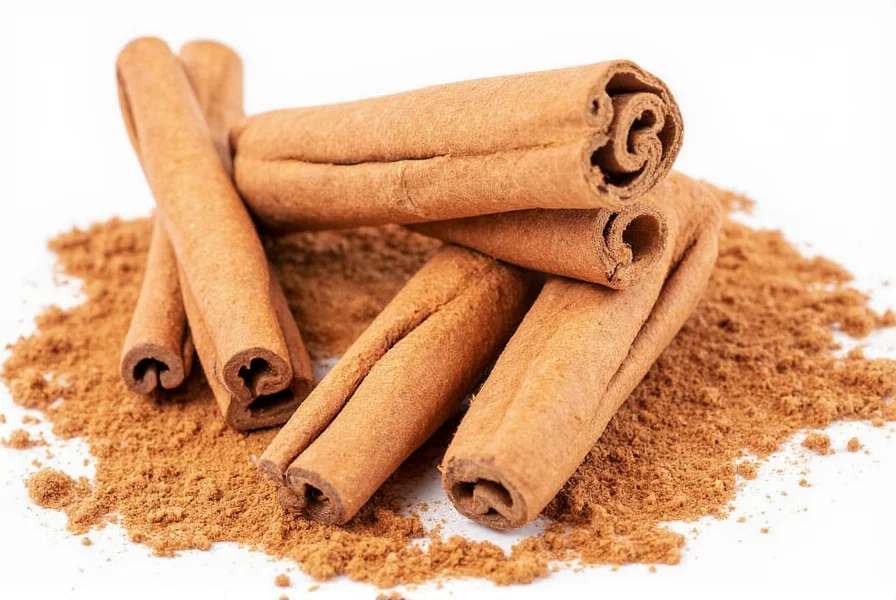Cinnamon isn't just a flavorful spice for your morning coffee or baked goods—it's a powerhouse of health-promoting compounds backed by growing scientific evidence. This ancient spice, used for thousands of years in traditional medicine systems across Asia and the Middle East, has emerged as a subject of serious scientific interest for its potential therapeutic properties.
The Science Behind Cinnamon's Health Benefits
Modern research has validated many traditional uses of cinnamon while uncovering new potential applications. The key bioactive compounds responsible for cinnamon's health effects include cinnamaldehyde (which gives cinnamon its distinctive flavor and aroma), polyphenols, and other potent antioxidants.
Top 6 Evidence-Based Health Benefits of Cinnamon
1. Blood Sugar Regulation and Diabetes Management
Multiple clinical studies demonstrate cinnamon's impressive ability to improve insulin sensitivity and lower blood glucose levels. A comprehensive review published in the Journal of Medicinal Food found that cinnamon supplementation reduced fasting blood glucose by 10-29% in people with type 2 diabetes. The spice appears to mimic insulin's effects and enhance glucose uptake by cells, making it particularly valuable for those managing prediabetes or metabolic syndrome.
| Health Benefit | Scientific Evidence | Recommended Daily Amount |
|---|---|---|
| Blood sugar control | Multiple RCTs showing 10-29% reduction in fasting glucose | 1-6 grams (1/2 to 2 teaspoons) |
| Antioxidant activity | ORAC value of 267,536 μmol TE/100g (among highest of all foods) | As part of regular diet |
| Heart health | Studies show up to 27% reduction in LDL cholesterol | 1-3 grams daily |
2. Powerful Antioxidant Properties
Cinnamon ranks among the most antioxidant-rich foods on the planet. Research measuring Oxygen Radical Absorbance Capacity (ORAC) shows cinnamon has an exceptionally high score of 267,536 μmol TE/100g, significantly outperforming many fruits and vegetables. These antioxidants, particularly polyphenols, combat oxidative stress and may reduce the risk of chronic diseases including cancer and neurodegenerative conditions. A study in Oxidative Medicine and Cellular Longevity found cinnamon's antioxidant activity even surpassed that of garlic and oregano.

3. Anti-Inflammatory Effects
Chronic inflammation contributes to nearly every modern disease, from heart disease to cancer. Cinnamon contains compounds that inhibit inflammatory pathways in the body. Research published in the BMC Complementary and Alternative Medicine journal demonstrated that cinnamon extract significantly reduced inflammatory markers in human cells. Regular consumption may help mitigate inflammation-related conditions including arthritis and inflammatory bowel disease.
4. Heart Health Protection
Heart disease remains the leading cause of death globally, but cinnamon shows promise for cardiovascular protection. Clinical trials indicate cinnamon can reduce several key risk factors: lowering LDL cholesterol by up to 27%, reducing triglycerides by 29%, and decreasing blood pressure. These effects appear to work synergistically, making cinnamon a valuable dietary addition for heart health maintenance. The spice may also prevent the buildup of plaque in arteries through its antioxidant and anti-inflammatory actions.
5. Brain Function and Neuroprotection
Emerging research suggests cinnamon may protect against neurodegenerative diseases like Alzheimer's and Parkinson's. Animal studies show cinnamon compounds can inhibit the buildup of tau proteins (a hallmark of Alzheimer's) and protect neurons involved in Parkinson's disease. While human trials are still limited, the spice's anti-inflammatory and antioxidant properties likely contribute to cognitive protection. Regular consumption may help maintain brain health as we age.
6. Natural Antimicrobial Properties
Cinnamon has demonstrated significant antibacterial and antifungal properties in laboratory studies. The compound cinnamaldehyde effectively inhibits the growth of various pathogens including E. coli and Candida species. This explains cinnamon's historical use as a food preservative and suggests potential applications for fighting infections. Some research indicates cinnamon oil may be effective against antibiotic-resistant bacteria, though more human studies are needed.
Ceylon vs. Cassia Cinnamon: Understanding the Difference
Not all cinnamon provides equal health benefits or safety profiles. Two main varieties dominate the market:
- Ceylon cinnamon ("true cinnamon")—lighter color, thinner bark, more delicate flavor, and significantly lower coumarin content
- Cassia cinnamon (common in supermarkets)—darker, thicker bark, stronger flavor, and higher coumarin levels
Coumarin, while providing some health benefits, can cause liver damage in sensitive individuals when consumed in large amounts over time. Cassia contains about 1% coumarin by weight, while Ceylon contains only trace amounts (0.004%). For regular consumption, especially for therapeutic purposes, Ceylon cinnamon represents the safer choice. Those with liver conditions should particularly opt for Ceylon variety.
Recommended Dosage and Safety Considerations
Research suggests effective doses for health benefits range from 1-6 grams (approximately 1/2 to 2 teaspoons) daily. Most studies showing blood sugar benefits used 1-3 grams daily. While cinnamon is generally safe as a food spice, higher therapeutic doses should be approached with caution:
- Limit Cassia cinnamon to 1 teaspoon daily due to coumarin content
- Ceylon cinnamon allows for more generous daily consumption
- Consult your healthcare provider if taking blood thinners (cinnamon has mild anticoagulant properties)
- Those with liver conditions should exercise caution with Cassia cinnamon
- Pregnant women should consume cinnamon in typical food amounts only
Practical Ways to Incorporate Cinnamon Into Your Diet
You don't need supplements to enjoy cinnamon's health benefits. Simple dietary additions include:
- Adding 1/2 teaspoon to morning coffee, tea, or smoothies
- Sprinkling on oatmeal, yogurt, or fruit
- Using in savory dishes like curries and stews
- Creating a cinnamon-honey tea for natural sore throat relief
- Replacing sugar with cinnamon in baking recipes

Limitations of Current Research
While promising, it's important to recognize limitations in cinnamon research. Many studies have been conducted in test tubes or on animals rather than humans. Human trials often involve small sample sizes and relatively short durations. More long-term, large-scale human studies are needed to confirm optimal dosages and fully understand cinnamon's therapeutic potential. Cinnamon should complement—not replace—standard medical treatments for conditions like diabetes.
Conclusion: Cinnamon as Part of a Healthy Lifestyle
Cinnamon represents a rare example of a common kitchen spice with substantial scientific backing for health benefits. From blood sugar regulation to powerful antioxidant protection, this ancient spice offers multiple pathways to improved health. By choosing Ceylon cinnamon for regular consumption and incorporating it into your daily diet in appropriate amounts, you can harness these benefits safely. Remember that cinnamon works best as part of an overall healthy lifestyle including balanced nutrition, regular exercise, and proper medical care when needed.
Frequently Asked Questions
What's the difference between Ceylon and Cassia cinnamon for health benefits?
Ceylon cinnamon ("true cinnamon") contains significantly less coumarin than Cassia cinnamon, making it safer for regular consumption. Both varieties offer similar health benefits including blood sugar regulation and antioxidant properties, but Ceylon is preferred for therapeutic daily use due to its lower coumarin content. Cassia contains about 1% coumarin by weight while Ceylon contains only trace amounts (0.004%).
How much cinnamon should I take daily for blood sugar control?
Research shows effective doses for blood sugar management range from 1-6 grams (approximately 1/2 to 2 teaspoons) daily, with most studies using 1-3 grams. For Cassia cinnamon, limit to 1 teaspoon daily due to coumarin content. Ceylon cinnamon allows for more generous daily consumption. Consult your healthcare provider before using cinnamon therapeutically, especially if you have diabetes or take blood sugar medications.
Can cinnamon help with weight loss?
While cinnamon isn't a weight loss miracle, it may support healthy weight management indirectly. By improving insulin sensitivity and blood sugar control, cinnamon can help reduce cravings and prevent blood sugar spikes that lead to fat storage. Some animal studies suggest cinnamon may influence fat metabolism, but human evidence for direct weight loss effects remains limited. Cinnamon works best as part of an overall healthy diet and exercise plan for weight management.
Is it safe to consume cinnamon every day?
Yes, consuming cinnamon daily is generally safe when taken in appropriate amounts. For Ceylon cinnamon, up to 1-2 teaspoons daily is considered safe for most people. For Cassia cinnamon, limit daily intake to 1 teaspoon due to its higher coumarin content. Those with liver conditions should particularly choose Ceylon cinnamon and consult their healthcare provider. As with any dietary change, start with smaller amounts to assess tolerance.
How long does it take to see health benefits from cinnamon?
Research suggests it may take 4-12 weeks of regular consumption to notice measurable health benefits from cinnamon, particularly for blood sugar regulation. Some people report feeling subtle effects like improved energy levels within a few days. The timeframe varies based on individual factors including health status, dosage, and consistency of use. For therapeutic purposes, most studies have examined effects after 8-12 weeks of daily supplementation.










 浙公网安备
33010002000092号
浙公网安备
33010002000092号 浙B2-20120091-4
浙B2-20120091-4